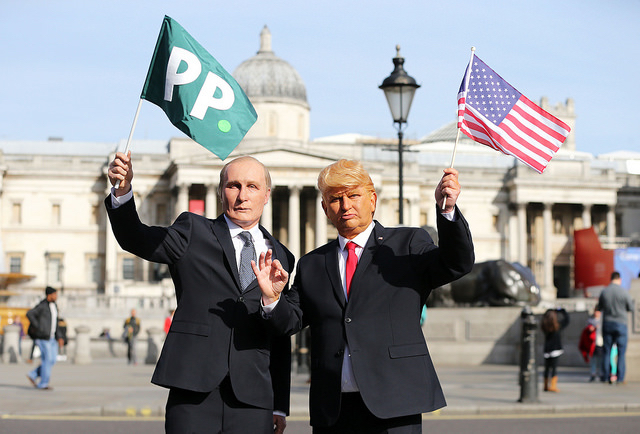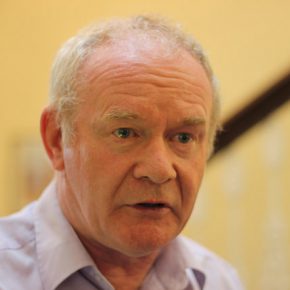President Trump continues to face paranoid accusations that he was elected with the direct assistance of the Kremlin. As a result of the Cold War theatrics, Trump’s most realistic objectives in U.S.-Russia relations, as well as his broader international outlook, have not been properly discussed.
It is true that Trump’s team has been in frequent contact with Russia. Trump has also gone out of his way to excuse Vladimir Putin’s political conduct. What is missing, however, is direct proof of a conspiracy directed by the Russian government. The scandal has conjured frightening images of powerful Russian hackers that Putin will use to intimidate European democracies, but thus far, only circumstantial evidence has been released. Rather than Kremlin interference, it is more likely that since his campaign, Trump has seen Putin as a useful ally in upending the post-war liberal order.
The Trump Administration is approaching foreign policy with an emphasis on narrow bilateral agreements that favour American companies, and a promotion of authoritarian self-interest. It does not seek to promote or emphasise liberal values like free elections, the rule of law, and human rights. Instead, Trump wants the U.S. to make cynical “deals for America.” In the case of Russia, this means increased American involvement in its oil and gas sector, while tolerating Putin’s regional aggression and domestic crackdowns, and pressing for greater diplomatic and military cooperation in Syria.
It’s worth beginning with oil and gas, if only because Trump’s Secretary of State, Rex Tillerson, was active in Russia when he was the CEO of ExxonMobil. Tillerson’s appointment has been widely condemned because he has no obvious environmental credentials, and because his petroleum industry background distorts his views of the Middle East. Tillerson’s role in crafting a new relationship with the former USSR has been less discussed, except for general concern about his business ties to the country.

From 1996 to 2014, Tillerson was heavily involved in ExxonMobil’s efforts to gain control of Russian oil and gas fields, with the support of both the Clinton and Bush administrations. By 2012, ExxonMobil boasted strong partnerships with local companies like Rosneft, as well as successful efforts to drill the Black Sea. Tillerson had ingratiated himself with his Russian colleagues so well that Putin awarded him the Russian Order of Friendship in 2013. ExxonMobil was set to expand its Russian operations further, and begin drilling the Arctic, when Russia invaded and annexed Crimea in 2014, suspending its plans.
Given Tillerson’s strong ties with Russian politicians and businessmen, it’s fair to speculate that Trump appointed him to push for a “thaw” that would be among the first of his new web of bilateral arrangements. In Russia, American companies, and to a lesser extent their Russian counterparts, would profit immensely from the extraction of Russian oil and natural gas. Tillerson himself would receive an enormous windfall for his efforts, especially if he’s able to help offset the catastrophe of “peak oil” by tapping Russian natural gas reserves, which are the largest in the world. As economic ties deepen, Trump would also tolerate (if not enthusiastically support) Putin’s strongman tactics, deepening his authoritarian hold on the country.
Stronger U.S.-Russia relations would be immediately apparent in Syria. Until now, the two have been ignoring each other in the country, in spite of their diplomatic and rhetorical attacks. Normalised ties would mean that Russia and the United States could agree to a common policy, instead of simply pursuing their own interests alongside each other. Trump would be free to abandon the Syrian rebels altogether, build a working relationship with Assad, and effectively support a military dictatorship in a war against Islamic State. Skeptical readers should remember that Obama’s Iran Deal succeeded in part because Tehran’s assistance was required to push back Islamic State’s advances in Iraq. Anti-terrorism makes a lot of initiatives palatable.
These plans seem unlikely, at the moment. Trump’s foreign policy initiatives have either been challenged in court, or slowed down significantly by a Russia scandal that he has no idea how to manage. Indeed, Democrats have managed to stoke enough anti-Russian sentiment that a thaw currently seem impossible. Regardless, Trump does have a workable political vision. It’s just that many of his objectives have been stopped, or at least delayed, by an unexpectedly strong grassroots and congressional opposition. At the moment, it remains to be seen if his administration’s obvious desire to strengthen ties with Russia will ever happen, though the basic formula (boosting economic and security ties with a strongman without any reference to liberal values) could end up working in Syria and other countries.
Photographs courtesy of Taylor Herring and kbrookes. Published under a Creative Commons license.





